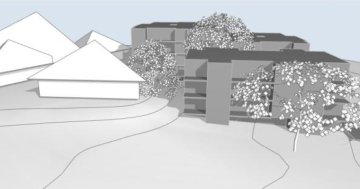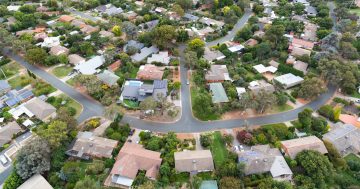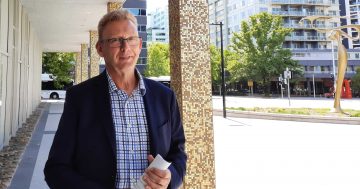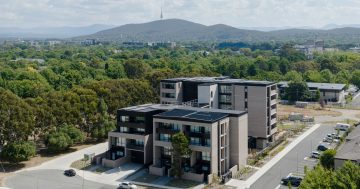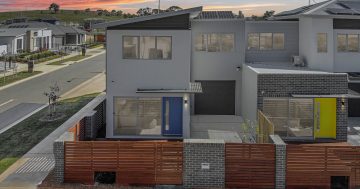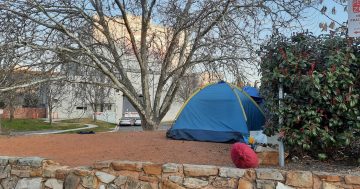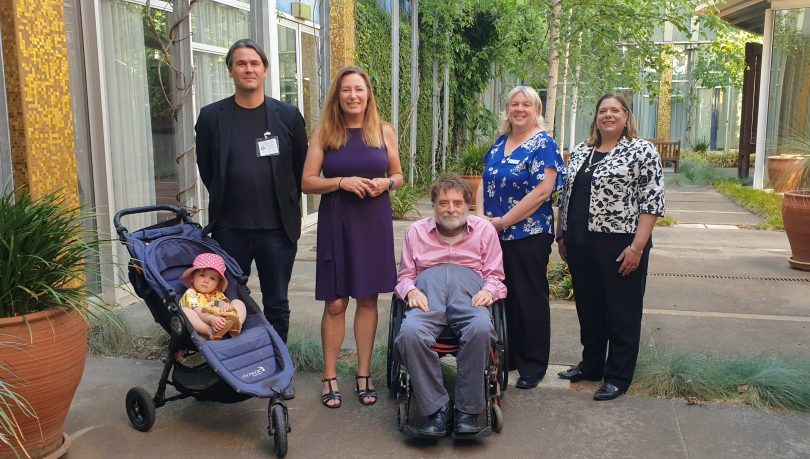
Build.Rent’s Nathan Judd, Housing Minister Yvette Berry, executive director of Community Connections Dougie Herd, CatholicCare Canberra and Goulburn CEO Anne Kirwan and executive director of Community Services Cara Jacobs at the announcement of the grants at the Legislative Assembly.
It says a lot about the ACT’s rental market that an income of $100,000 is not considered enough for many Canberrans to put a roof over their heads.
Catholic Care Canberra and Goulburn is one of six organisations to share in grants worth $645,000 to provide more affordable housing in Canberra. The project is aimed at the first and second quintile of incomes, up to $100,000.
CEO Anne Kirwan said a project to design and build 6-8 units targeted at women aged over 50 and people with a disability will include an income cap of $100,000 for applicants, which she says sounds like a lot but not when you’re renting in the ACT market.
“It’s amazing that people on $100,000 are finding it difficult to access housing in Canberra but it’s the most expensive place in Australia to rent and we want to be part of the solution,” Ms Kirwan said.
CatholicCare has received $50,000 to identify under-utilised Church land that is zoned for community facility use. It will pay consultants Colliers International to manage the complex zoning and land use rules, and Cox Architects to design energy-efficient buildings that make the best use of the land.
Ms Kirwan said CatholicCare hoped to develop a viable model for affordable and supported housing in the ACT. Rents for the affordable component would be set at 75 per cent of the market rate.
The organisation is also partnering with Housing ACT in the recently launched Housing First initiative which over two years will assist 20 long-term homeless people with complex needs into permanent homes.
One man who has been sleeping rough for 20 years is now housed and CatholicCare has a group assessed through Vinnies’ Street to Home program ready to be alotted homes.
The second-round grants announced on Thursday have been sourced from the Affordable Housing Innovation Fund.
ACT architect Nathan Judd’s Build.Rent initiative has received $125,000 to help establish long-term, below-market rate rental housing targeting people in the first and second income quintiles.
It plans an affordable rental apartment development in Belconnen with 80 micro terraces offered to people on lower incomes (with an annual review of eligibility) at a rent capped at 20 per cent lower than the average market rate. The development will include eight accessible units offered to tenants with disabilities also at 20 per cent below market rent.
YWCA for YHomes has also received $125,000 to help deliver supportive housing for older women on an under-utilised block in Ainslie.
Summer Foundation Limited ($35,000) will assist 20 people with disability likely to be eligible for Specialist Disability Accommodation in the ACT to complete a new housing needs tool. The results will be aggregated and analysed, and a briefing paper will be prepared with recommendations.
Rights and Inclusion Australia ($90,000) aims to reduce housing stress among people with disability in the ACT by increasing information about and identifying a range of suitable housing options available to this population.
Community Connections (Homeshare ACT) received the biggest grant at $220,000 for a project to establish a model aimed at matching homeowners with a spare room with low-income tenants seeking affordable rental accommodation in exchange for providing assistance around the home.
The Government says Housing ACT is also providing an additional $6.524 million in funding to support frontline services and address gaps in its homelessness service system.
It has extended the operating hours of the Early Morning Centre to enable the delivery of additional services and activities to improve guests’ social skills, social inclusion, and health, job and educational outcomes.
It has boosted funding for the Doris Women’s Refuge, Beryl Women Inc, Toora Women Inc and Karinya House for Mothers and Babies Inc to support greater stability for women and children escaping family and domestic violence, and to prevent children from entering child protection and reduce the impact of intergenerational homelessness.
Two new homelessness services have been launched in the past year. One supports older women into affordable housing options in both public and private sectors, operated by the YWCA; the other is for asylum seekers and people with uncertain immigration status, operated by Migrant and Refugee Settlement Services (MARSS).
Over the next five years the Government will spend $100 million on the renewal of at least 1000 public housing properties as well adding 200 homes the portfolio to help with the waiting list.












